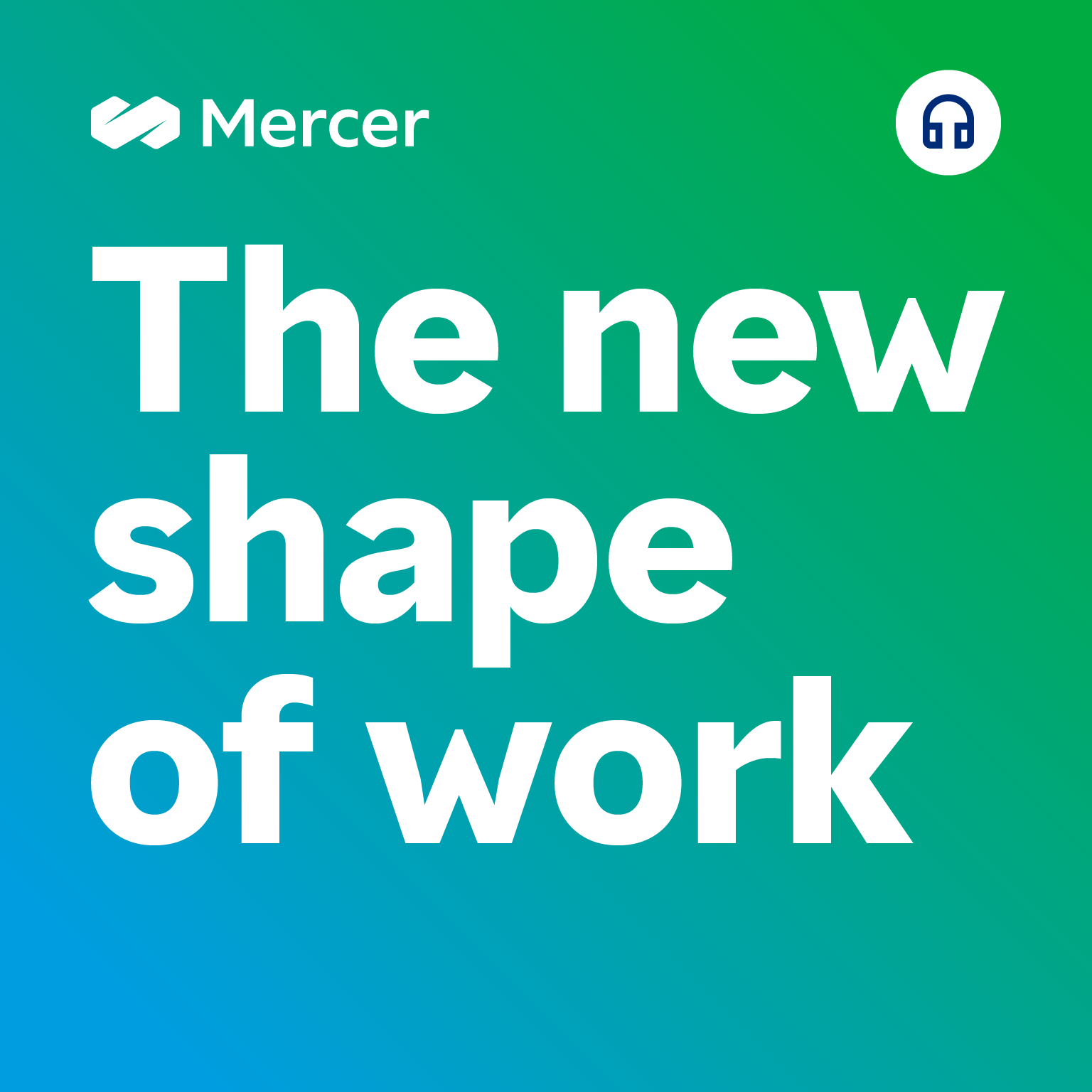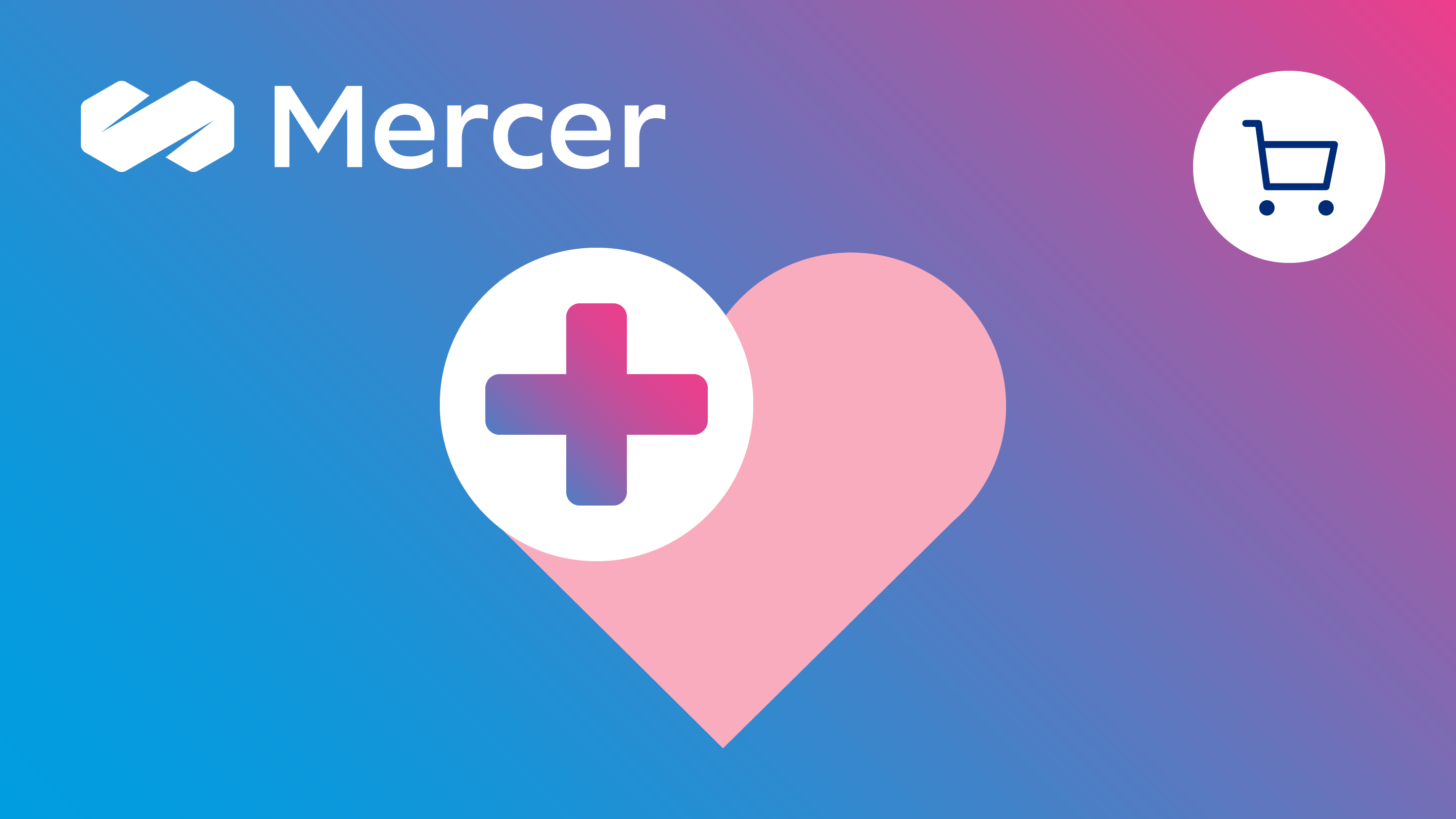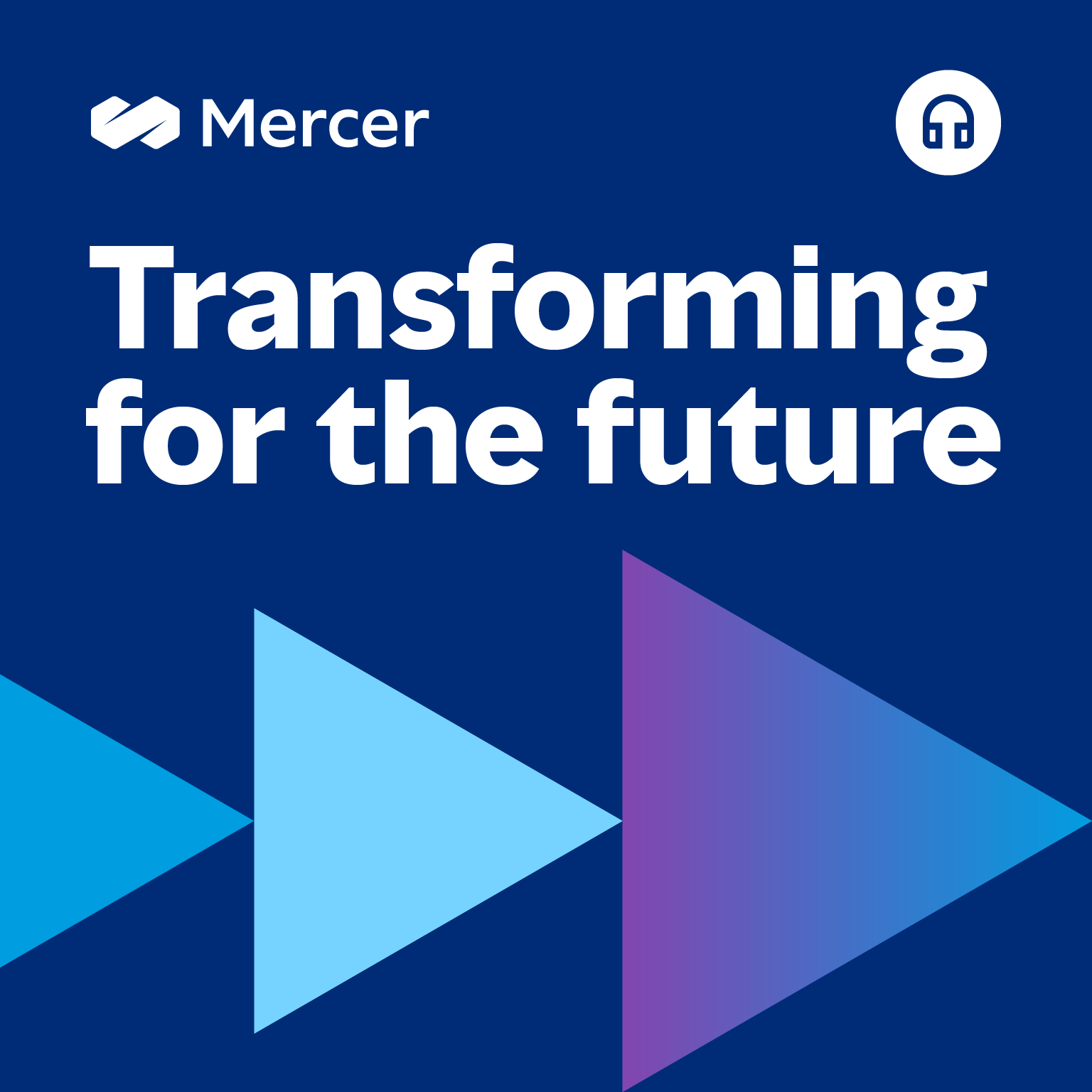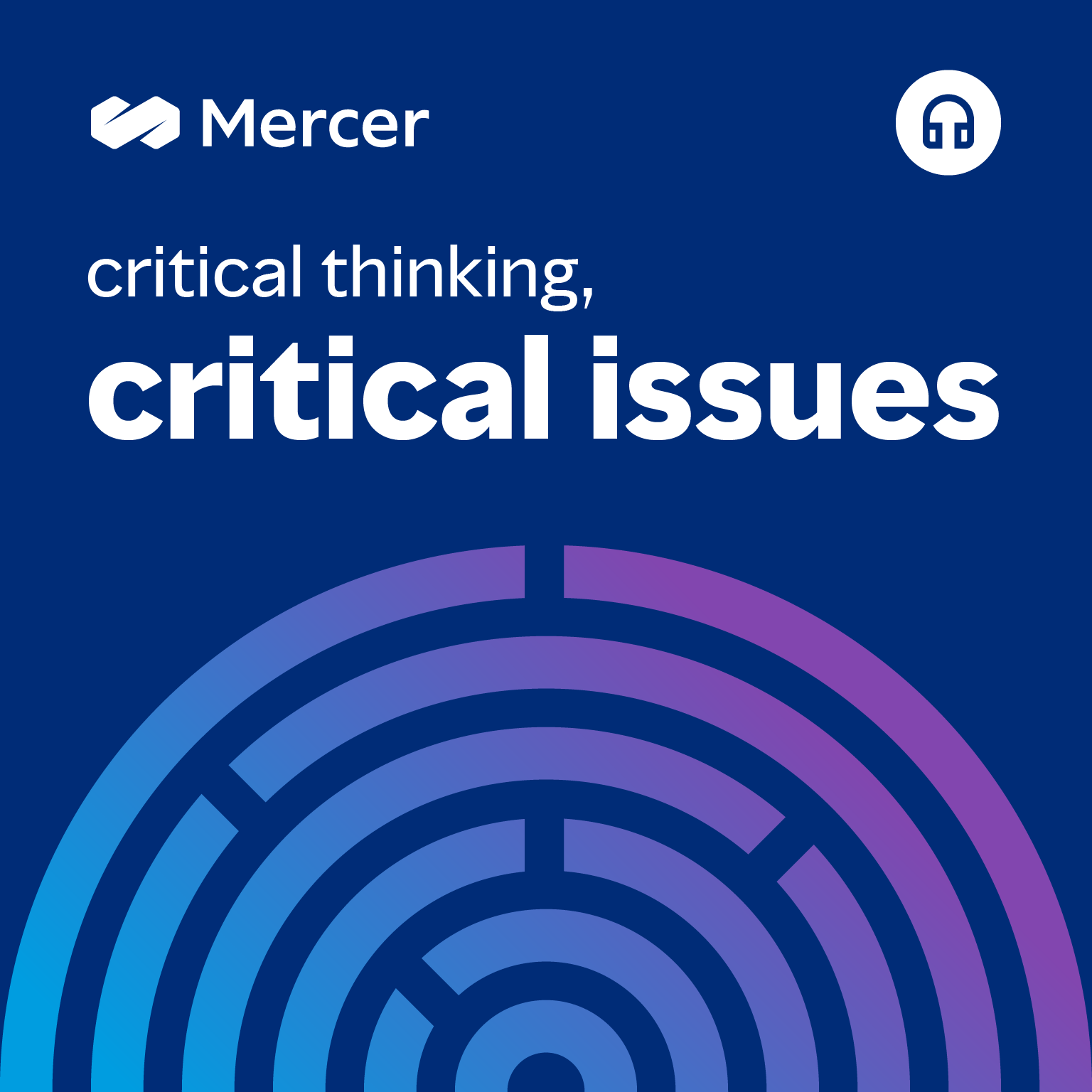[MUSIC PLAYING]
Welcome to Mercer's podcast series on The New Shape of Work. I'm Kate Bravery, Mercer's Talent Advisory Leader. And today, I'm joined by Susan Youngblood, founder and CEO of Chief People Solutions.
Susan is a seasoned CHRO who's been helping the C-suite and board members preparing their workforce for AI, which I think is one of the hottest discussion topics of the time. Susan, I know that we've been trying to organize this chat for a while and I'm really glad you're free to join us today.
Kate, It's great to be here. And I'm really looking forward to our conversation.
Me, too. Me, too. And Susan, it's been a few months now since we were chatting about this. I think it was at the beginning of this year. We were talking at a chief people officer round table in New York.
And I think one of the things that got us both fired up is although there was a lot of academic expertise about how AI will impact the workforce, what might be the number of tasks that will impact, how it might change skills, just the practical experience in the room was pretty low. And I think we all felt that we were at the beginning of the journey of discovering what it would mean for the HR function and the workforce. And I think you and I were looking at each other saying, the time is now and we all need to speed up our knowledge.
So I'm excited to get you on the podcast today so we can really be chatting about in the last few months what really has been working. How are people thinking about building the competence across their workforce? What are the watch outs? And what do we need to do if we want to spur on more human machine teaming in our teams?
Well, why don't we kick off with a little bit of research. I often do that. We've just done a study of employees around the world, and one of the things I found that was fascinating is we asked employees, when you think about the different members of the C-suite, who do you see as most digitally fluent?
And then secondly, we asked, who's most vocal about using AI? And it probably won't surprise you this, but I found it fascinating. The CHRO did not come out, particularly high as being seen as digitally fluent. But hold on, when they were the ones talking about the benefits of using AI and role modeling AI, they were the ones that had the biggest impact on the workforce using AI, actually three times more impactful than the CEO talking about it.
So I think that's really interesting. They're not seen as digital, but when they do lean in, they have an outsized impact. And I think that just underscores the need for them to really be leading the charge here.
So I want to talk about this topic of being digitally fluent. And that I'm speaking to the converted here because I do remember that, I think, your LinkedIn profile says, "I'm a digitally fluent Chief People Officer." And I just found it fascinating that you had to call it out.
And I also know that you've been responsible, not just for introducing AI in the workforce, but also upskilling. I think it was about 13,000 people across the tech org. So I you've got a strong view on this.
Does HR need to be more digitally fluent? What's getting in the way? And how can we get us all on that journey?
I have some great learnings and some battle scars from those experiences, so I definitely have a point of view. I think it's the entire C-suite and board members, not just the chief people officer who need to be digitally savvy. So because it's--
[INTERPOSING VOICES]
I mean, it's the truth is we may have the focus on us today, and I will speak to that separately. But when you look as organizations are shifting towards AI-driven solutions, all executives who understand technology today and specifically AI will be seen as the forward thinking leaders who are ready to steer their companies through transformation. This speaks specifically about the role of the chief people officer. Given the impact of AI on the workforce globally, I believe that to perform their job effectively, chief people officers really must understand what the capabilities of AI are and the potential impact on work and workers.
And to back this up, AI and generative AI are going to affect and are affecting nearly every element of human capital planning. So, for example, we're going to need to upskill and reskill on a regular basis because AI advancements are happening so rapidly. Kate, thinking back to when you and I first spoke about this, so much has transpired. It's not even the same landscape anymore. It's just mind boggling.
On a related side note, in a recent report, only 24% of polled companies make a clear connection between corporate strategy and reskilling efforts. So, as a chief people officer, getting in front of your CFO to get the right resources and investment to handle this amount of change is important as it's not lightly factored into the plan. I know this from experience.
I love that point there about the chief people officer having those regular conversations with the CFO and making the business case because we have different data that's saying we don't have enough talent, we don't have the right skills. Skills are going up in the cost, and so it's expensive to bring people in. And these are related concerns.
So if we're doing corporate strategy over here and then over here, we've got the L&D department looking at reskilling efforts, that's not fast enough. Those need to be a lot more connected. I agree with you.
I think being really proactive in this age of AI and making sure that your peers and the CEO know exactly what's required to get to the end game with AI is really important.
There's so many other things that I could get into. But I mean, when you think about the implications, it's possible that your entire geographic footprint could change. I mean, this could happen if you find that much of your call center work and coding work's being automated and those centers are in low-cost countries.
Again, every single element of human capital planning is being influenced by this AI change. And I would think that most CEOs would expect their chief officers to have this foresight into the changes and to work proactively with their C-suite peers to plan ahead. On a positive note, Kate, I really think that CPOs and HR leaders are very aware of this need.
I agree with you. I agree with you. I think the challenge is, how do we go from understanding the magnitude of the challenge ahead and knowing where to start? It's like that, where do where do I start to eat the elephant? And I know we're going to get into that today.
But your comment there about that geographic footprint change, I think, is really important because I think everybody's being asked, particularly this year, to do more with less. And actually, many of us have squeezed as much as we can out of our labor arbitrage activities. So we now need to combine them with digital arbitrage and start thinking about, it has to be AI automation and looking at where that labor is situated.
And that doesn't just change because of the cost basis. It also changes to where that skill and expertise is. And that's going to shift the center of gravity for some of our clients.
Absolutely.
All right, well, I love everything that you're saying here about, look, we have to plan ahead. I think workforce planning has gone into hyper gear, given the changing skill set and the new skills coming in because of AI. And we do need to make sure that we have that foresight.
Because what we want to about the leaders coming into our business has significantly changed. At the top of the house, we want those leaders and executives that can cultivate that digital first culture that we've just been talking about. But we also need that data lower down the organization.
I think we've seen a huge expanse of credentialing and being able to understand the coding skills and the technical skills. But as that skill pattern is going to shift, getting a handle on some of those more human skills is also going to be really critical.
I do know that boards-- and you sit on the boards, I sit on boards-- have been talking actively about what is our responsibility with regard to AI. What are the opportunities for us to work and operate differently. I know that Hong Kong has its first AI board member. And boy, I'd love the idea of having someone who's got a permanent company memory or can help us with some of those intersecting risks that we're now facing today. Maybe from some of your board experience, I'd love to hear what are you hearing some of the discussions about and any tips for those that sit on boards listening in today?
And you're right, this is a hot topic at the board level because quite frankly, there's so much discussion about the risks. And there are real risks. So in my experience, there's a number of questions that board directors are digging into when their companies deploy AI, and I'll just touch on a few.
I think the first is around accuracy and accountability. I mean, how reliable is the data driving your AI decisions? And what safeguards are in place to ensure transparency?
Companies have to be transparent about how their AI algorithms operate, and they have to be ready to explain the logic behind the AI-driven outcomes to prevent embedding real-world biases into their AI. That's a really big one. In addition, boards are asking questions like, are we prepared to address the ethical dilemmas that AI introduces? There's no shortage of articles on all of these topics.
And then, are we prepared if there's some unforeseen issue that could cause us reputational harm? And if there is, who's the SWAT team that's going to quickly address this massive issue? So, I mean, the list is endless, Kate, but you get the idea that this is really a hot topic.
Totally. And I think we've been looking at adverse impact of algorithmic decisions, I think, for a while. But with the new European AI laws, we do have more responsibilities, particularly in those high risk categories, to be monitoring it. And many commentators, I think, has spoken about the fact, if the data is based on human data, human data has got a lot of biases in and we don't want to systemize it.
I actually welcome the fact that we are now taking a look at this because I think a lot of this was happening anyway. We just weren't focusing in on it. And I do think being really transparent about how decisions are being made, what data that we're using for them is only going to grow in importance. I mean, we've seen with laws increasing about pay transparency, how that has driven different behaviors and more intention about being ethical and equitable in terms of the decisions. And I think we're going to see the same things with talent insight data as well, which I really do.
But I love that last question you mentioned there about who's the SWAT team. One of the things that we have been tracking is the rapid response teams that organizations have when faced with new risks. And the reality is we all had a great team following COVID, but many of us have disbanded those teams. And so when these issues pop up, we're sometimes not ready to support in that.
Yes, as I'm sitting here thinking about how that chief people officer or other HR roles are going to look so different in the future. If I think about the people that have gone into HR, they've gone into HR because they've known someone who's been in that role, or we did a really good job of giving them a realistic job profile. [LAUGHS] And we're really going to have to change that. And I wonder how we can inspire younger generations to enter this profession and get excited about what this role will look like in a few years time.
I agree. All the roles in HR and actually in many functions across the organization, whether it be finance or HR or anything, are going to be different. But I think these roles are going to be more attractive today to younger people because many of the repetitive process work things that we don't really love will hopefully be automated going forward.
And that frees us up to do things that are more fun and more creative and probably the reasons why we got into HR in the first place. And I do think that HR professionals are starting to think about the potential changes now and considering what skills will be valued in the HR function in the future. It's going to be an evolving conversation.
And I know that you've been doing some great work, I think, at Cornell in inspiring young people on this. Maybe you can just share some of the things that are coming out from your work with that group.
Inspiring might be a stretch, but I did take a couple classes. So, yes, I was fortunate to have a professor invite me to come. And they bring in practitioners to help give the students a realistic view of HR roles at the ILR School at Cornell.
And I wanted the students to think about the big-picture implications. So I took them on a deep dive into the sector applications of AI and the jobs that are most likely that are going to be exposed to it. Then we talked about the human skepticism and resistance to AI that could hamper AI adoption and ROI, because that's really in our space. And then last I talked about the top three Gen-AI-induced pain points for Chief People officers so that the students had a better understanding of what's required in the role. It definitely was an eye opener because I think they were really, really more focused on using AI for themselves, like using ChatGPT to solve problems or things like that versus thinking about it at such a macro level.
No, that makes absolutely sense. Actually, we've also just come off a cohort. I think we had about 400 people go through our AI learning for HR. And we were just the other week reflecting on what have been some of the comments from these young HR practitioners that are going through this program. It's hybrid, so you get some discussions.
And there was some really interesting findings from that. I think one of them was HR talking to HR and the art of the possible doesn't work if we don't have IT in the room. And I think many of them said, we just don't have that close working relationship or knowledge about tech and IT to really breathe life into that. And so one of the big takeaways was we've got to get closer to them and we've got to partner with them more. So I thought that was really interesting.
Another one was grappling with the high expectations coming in. Young people are coming in using some of these tools in their personal life and really pushing the business to say, when are we going to have these tools for the way we look up content or the way we brainstorm or the way we innovate some of our new products. And the company wasn't prepared to respond to that. And so HR was saying that's sort of a new responsibility that they have, too.
And then the third one, I think, there was some polls as part of the training around how much are people using tools that aren't sanctioned to do some of their work. And I think you and I have both been seeing that people are getting a little bit nervous about telling people that they're using it because they're worried that maybe it will impact how they're viewed in the job. And probably, to speak on your behalf as well, Susan, we would say actually somebody who's using AI in their work and having conversations with AI regularly, we actually think that's a positive thing.
But I was quite surprised how many of the people were hiding that. And there's some real risk there. I mean, when you can pull out your smartphone and take a snapshot of what you see on a screen and then put it into a large language model that is not gated, that's a real risk. And so I think some honesty about that was also coming up. And there were things I hadn't sort of expected to come out and just again reminds us what a significant behavior change this behaviour is and how the risks are far reaching.
I agree. And I think we should all assume that everybody is using AI at work. If you--
Yes.
Whether you have an AI policy or not, people are using it. And actually, I listened to an interesting survey on a podcast I was listening to, and it said that absolutely people are using AI in the workplace and maybe even the work provided tools, but they're not telling anybody about it. So they're not sharing what they're doing because they're nervous.
They're scared they're doing something wrong. They're nervous they look like slackers now that they have this extra time, and what are they doing with it? I mean, so it's fascinating how people are thinking through this as they are using the tools and work.
And the interesting is some of those tools outside of work-- and we probably all use a whole variety of them for different things-- they're so much more intuitive and easy to use. Whereas what we heard from the internal HR population is these tools take time to learn. And I just the other week I was at UNLEASH in Paris, and its tech provider after tech provider after tech provider, AI, AI, AI. It's really exciting but boy, is it exhausting.
And I think we've got to step back and think about if we introduce yet another tool, what's the unlearning that needs to happen? Do we have capacity for that? Because I do think the work and the skill set that is needed to drive new ways of working is probably the hardest bit to solve for.
Yeah, I would agree. It's definitely a challenge. And you're right. And we, in the HR community, tend to get and it's not just HR community, everybody is getting mired in the allure of all these different tools and automation and the push to get ROI.
But I think standing back and looking at the big picture is another important step and really looking at what is the work and what are the skill sets that we're going to need in the future going to look like. And it's and it's a big task. I mean, when AI deployed, one of the first steps companies need to do is help employees work effectively alongside it. I mean, that is a massive step for most people, and especially in cultures where it's risk averse or there's not this culture of creativity and learning and failing, it can be really scary. So I don't know if you have some thoughts on that.
Well, I think also we should-- maybe we can get into what we're really seeing making a difference. [LAUGHS] Because I do believe that those companies who are intentional about work design, so they are looking at how the work might look different in the future, disaggregating it into tasks, allocating which tasks might be better with machines and humans, and then reaggregating that job to not only optimize it based on who's better placed to do that, but also to solve some of the issues. We don't have enough people with the skills coming in, so we need people to be trained faster.
We need to create capacity in the job to learn the skills of the role above or where can we unify-- have more junior people doing that role. Or maybe are there certain tasks that actually we could outsource and have in the wider talent marketplace? I think all of these are ways that I do see companies really making progress on how will work look different and how do we prepare them for that work that looks different. But it is a commitment, and it's slow progress to get there. And you and I have spoken a lot about where are we at in understanding the skills we have today and the skills we have tomorrow, because that also has to be part of the equation as we move people into those new roles.
And that's a really hard thing. I think many CHROs and folks in the HR community will agree that it's tough to tell with the tools that we have today, what the skills we have are, and then also, if somebody is learning new skills to keep things dynamic and moving. And so if you're thinking about upskilling and reskilling and figuring out what work's going to look like, having that data is really critical.
And so I think that is something that we need to really focus on and getting tools in our hands that will enable us to do that. So Kate, I know that you have a lot in Mercer space that can actually help us with this. And maybe you can talk a little bit about that.
Well, I think, everybody's grappling with I don't have a clear view of the skills I have in my organization, let alone the ones I have in my contingent talent group. But I do think some of that's changing forms coming in or the talent marketplaces, I think, they do a very good job of inferring what skills people might have today and using skills to be able to move and deploy people. You mentioned there about data hygiene. I think having a really firm career framework, having skills that can map to that, I think, all of that work on skills, taxonomies or oncology's really make a big difference.
But to move at the pace that we need, we also need a real shift in mindset from managers about ensuring that we're thinking about keeping our people employable, ensuring that we are nudging people that haven't moved role or haven't developed new skills, and we're not holding our best talent. And I think some of those are much harder to make progress on. Just a couple of weeks ago, I was offsite with a global engineering firm, and they are on that path to becoming a more skills-powered organization.
And they said, if we're not meeting regularly to say, what are the shifts in behavior we want to see, we're not going to make the difference. So they've got like a benefit realization committee who's meeting every month to say, how much have we changed our mindsets and our skill sets to deliver on some of those changes, whether it's increased human machine teaming, whether it's freeing up people so that they can have more internal gigs, or whether it's just ensuring that people have more sustainable work practices because jobs have been redesigned to work with more of a being outcome? All of those are some of the things that they're driving at. But it does take intentional work design and monitoring that we're actually making progress.
And I would say we've had this discussion at many different conversations I've had. This redesign is a lot of work is what you said, and a lot of companies like to skip that step. They're like, let's go to the low-hanging fruit. We're going to automate this process. There's quick ROI, and I can show that I actually made an impact.
But where the real ROI is when businesses take the time and again, it takes time to actually dissect the work, figure out where generative AI is going to make the biggest impact, and then fundamentally change your business process. Think about the way you deliver products. Use AI to think about your customer experience or your service that you're delivering. That's where the real value is.
And the data is showing-- even data just from last month shows that most companies are still in the low-hanging fruit area of just automating versus going through the very difficult process. But there's big rewards at the end once they do this. So I love that you're seeing companies do that. I think there's only right now that I'm aware of that are really far along the way there.
Susan, we talked about how important it is to build that awareness. And I do feel that this is a rolling ball that we're trying to catch up on. [LAUGHS] If we've got people who've tuned in today who are saying, look, I want to not just train my teams on AI, but I want to make sure that we stay ahead of what's coming up. Is there particular places you're going to get your feed on this, podcasters, or influencers that you can recommend to people on the call today?
To keep up with AI, it can feel like overwhelming and like a full-time job. And everybody's thinking I'm already have a full-time job and really, how am I supposed to do this? Don't despair. Depending on how you like to learn, there are a number of ways to stay connected with a really minimum time investment.
One of the best ways to learn about AI is to use the tools yourself. Then you can speak with authority. And for those of you who are leading teams, you're setting a great example for your employees.
There's a lot of discussion about creating a culture in companies that encourages experimentation and making it OK to fail, especially in this era of generative AI. I'd encourage you to share your experiences, your failures, and get your teams talking about their own experimentation. This really helps shift people's mindsets.
For those of you who-- ChatGPT is like the Band-Aid or the Kleenex of generative AI tools. But there's many others you can experiment with, such as Microsoft Copilot that many are familiar with, [INAUDIBLE] and Gemini or other tools you can experiment with. And it doesn't have to be difficult. You can just first ask ChatGPT to help you write a LinkedIn post or give you suggestions on what to do for your family vacation.
Once you get familiar with the tools, I would say reading and listening to podcasts are another great way to get information. There are many, many articles about AI that are published on a daily basis. If you want to understand the big picture, I have found that articles from Harvard Business Review and then also the consulting firms to be helpful.
One of my favorites is "Where Should Your Company Start With GenAI" by Harvard Business Review. Kate at Mercer, I know you have loads of content such as the CPO's guide to losing-- using, not losing, using AI. So that's a great spot to go.
I will throw a warning in there. If you're doing your own research, I would encourage you to make sure you look at the dates on the articles that come up in your feed because even articles six months old can be out of date. So I would say, give it a time frame in which you want to read an article because otherwise it's completely irrelevant.
And for those commuters out there, I prefer to listen to podcasts. My top two favorites are the AI Daily Brief, which can be a little bit technical, but don't worry, as you listen to it day after day, you'll start to understand their jargon. And the Wall Street Journal Tech News Briefing, which covers all of tech. But every single day, there's an element of AI in the Tech News Briefing. So not only do you get the benefit of learning about AI, but what's going on in the tech world as well.
Susan, you've given some great ideas there. [LAUGHS] Anything else that you wanted to add before we close out today on what you're hearing, what you're seeing, or where people can learn?
I think I want to just end on a really positive note here. I think that there's a lot of discussion about AI and will it take our jobs, and how is it going to transform things. I think there's a really positive aspect to AI that we want to focus on.
And it really does free up time for employees to spend time doing things that are really high impact that AI can't do. Uniquely human skills, such as strategic thinking and using creativity to solve test problems really delivers high value to the company. And that's the fun stuff.
This is why we studied what we did. Economists believe that this shift is where people-- sorry, economists believe that this shift in where people spend their time will lead to greater improvements in innovation. And I just think that is such an awesome starting off point when we think about generative AI instead of getting embroiled in all of what ifs to really think about the end game here.
I agree with you. And I think as AI does borrow into many jobs, yes, there'll be some technical know how that we need today, but it is those more human skills that critical thinking, that leading and inspiring of people that will win out. And so I think leaning into human capabilities and building on our creativity and relationship skills is really going to stand us in good stead.
Susan, we are out of time today. But as I was just listening to you rattle off those different places people can go, I feel I'd be remiss if I didn't flag some of the ones from Mercer. We've got a great podcast by Jason Averbrook, who leads our digital transformation business. I think it's called The Now of Work. It's on a Friday, and it does talk about some of the different tech that is coming in.
I know that Ravin Jesuthasan has just published a book on the skills powered organization with one of the leading chief people officer thinkers in that space, [INAUDIBLE] at Standard Chartered. And I do know that we have a number of courses that we are running online. So those cohorts are happening in lots of different markets. And we're trying to just make sure that we stay in pace with our clients as we're learning about innovations and new practices. We're doing the same as you are advocating sharing it.
And everybody who's listening on the call, please make sure that you link with Susan or myself. Let's continue this conversation online. And share back your ideas and innovations. I think as we charter our path through this new and exciting world, it's going to be important for all of us to be building our own confidence around this topic, getting hands on, as you said, with AI, and getting more fluent about the challenges and the opportunity.
Susan, I'm really glad that you could drop in today. Wonderful to have you on the call. And everybody else on the line, if you're interested to hear more on some of the topics that we've touched on today, check out the mercer.com web page. Thank you for joining. Have a good rest of the day.
[MUSIC PLAYING]














